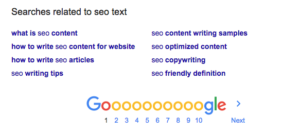While we are pumping a lot of sites for customers (and that in 2 languages), I figure that creating SEO’ed texts for a site is not as easy for writers as I thought.
Relevancy
First of all: good SEO copy is for the user – and I know, what you think: “he is only writing that, because he is afraid Google is punishing him for some black hat advice”: WRONG!
Good SEO texts cover the grounds of interest of the searchers. While doing so, you could go the wrong, but easy way by selecting (think of) words that are very elaborate and touch your topic on a metaphysical level, just to pump some lines out for the search engine. That is the typical creative way of writing, but does rarely lead to an optimized text!
The other approach is to just pick related terms like:
and then stuff your page with it. This is much better, because you have at least relevant additional words in your text, but over the years this has also proven to be dangerous (or in vain), because the semantic analytics of Google has become very advanced and while you CAN rank with some hollow text that contains these terms, you will not over the long run and here is why:
Pure “text mathematics” is just a signal among others to rank well. The usage patters of your site (which is obviously reported to Google from all Chrome users), the speed of your pages and ultimately the consistency of user behaviour became a key to ranking in the past years.
You can fake a lot, buy links, even buy traffic – but you can not buy retention on a serious level.

At this point the text quality and the mentioned engagement correlate: your text must lead users from sentence to sentence. Every second more on your page is a signal. The back button is your enemy!
Tools to improve your text
Nonetheless is good “text mathematics” (or Term Frequency Analytics – TFA as I like to call it) a good start to get the INITIAL ranking. The trick after that is to keep the user engaged. If you are looking for a (free) tool to help you: ryte.com is offering 5 free runs in their package and you might want to check that out:
and working along these “rough guesses” is a good way to get the writing juices flowing!
Another tool that is offering to create texts for you with REAL PEOPLE is www.textbroker.com – they have been around for a decade now and have evolved from simple text orders to managed text jobs for high volume orders. But even if you outsource to textbroker, upwork or other services: you have to control the text yourself. The real challenge is to keep the reader on the ball (are you still with me?). If you read up to here and used the Chrome browser, I have good chances, that this counts as retention.
Getting retention
Beyond the great sentences (hopefully with real info) you have to stich together for your users, another solid idea is to offer added value.
That is the source of the whole “Content Marketing Hype”: offering value beyond the text.
Some examples could be:
- Coupons at the end of the text (sorry, none here 😉
- Javascript tools in the page (like a calculator, quiz game, etc.)
- Funny animations
or anything that adds value to the information in your text for the user. On top of that, it helps to be social in your whole approach, which I described in my previous post.
The Boss Level of text
Right upfront: very hard and almost impossible to reach. On this level your text is “SEO”, “Social”, “Content Marketing” and “Conversion Driven” all on one page.
Normally that goal leads to shallow content with little help for anyone. So, focus on one thing with your content and take “Social” apart from “SEO”. You can have some sidebar with nice offers, but to make your text a real SEO driven text that keeps users: focus on the need they have, when they type in the term!
When you publish a very funny GIF, that everyone wants to share: that is “social” and a lot of copy with information gets lost, if you pour it below that GIF – same with good text. If you want to get A LOT of shares: nobody reads that much text and shares it to a lot of people – exceptions are know, but not the rule!
Focus on the search term you want to rank for and help users to find infos to their (suspected) need. Explain the aspects of the term you are targeting and you will automatically cover relevant terms!
Oh – and while many claim otherwise: a solid backlink profile (aka people linking to your text) is still a very important part of the whole thing!


Nice info on the relevancy issue right there. I often tell clients “Google’s primary product is a great search experience so content written to the visitor is the key to doing well in search results.” I think this helps them understand the SEO isn’t some voodoo, but a strategy.
Thanks, Stormy!